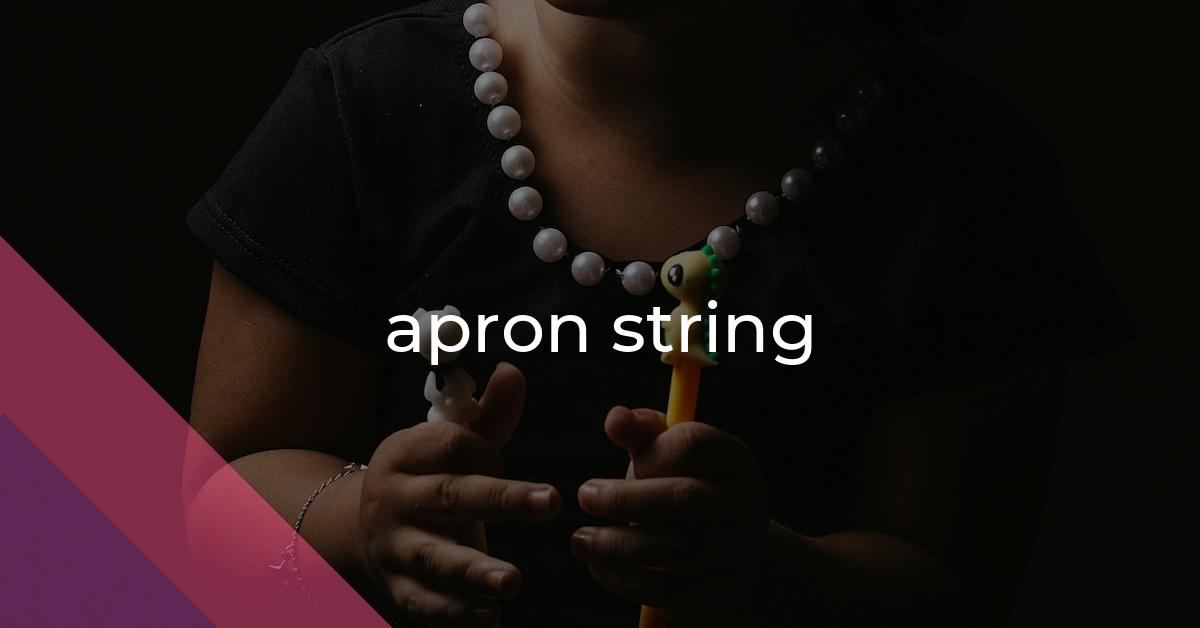apron string: Idiom Meaning and Origin
What does ‘apron string’ mean?
The idiom "apron string" refers to someone, typically a child or a young person, who is overly dependent on their parent or caregiver. It implies that the person is unable to make decisions or take actions independently, as they are constantly tied to their parent's figurative apron strings.

Idiom Explorer
The idiom "in someone's pocket" means to be under someone's control or influence.
The idiom "in short trousers" is used to describe someone who is young or inexperienced, often implying that they lack maturity or knowledge in a particular area.
The idiom "in one's pocket" means having control or influence over someone or something.
The idiom "in a bind" means to be in a difficult or challenging situation where there are not many options or solutions available.
The idiom "hold the purse strings" means having control or authority over financial matters or spending decisions.
The idiom "have someone's guts for garters" means to be extremely angry with someone and to be prepared to punish or harm them severely.
The idiom "harp on one string" means to repeatedly talk about the same topic or issue without considering other perspectives or topics.
The idiom *hang upon* means to be dependent on or influenced by someone or something.
The idiom "hang out to dry" means to leave someone in a difficult or vulnerable situation without support or assistance.
Origins Unveiled
The idiom apron string originated in the 19th century and is commonly used in American English. It refers to someone who is excessively dependent on another person, such as a child remaining excessively close to their mother or a wife being overly attached to her husband. This idiom evokes the image of a child or wife metaphorically being tied to the apron strings of their caregiver or spouse, symbolizing a sense of control or dominance.
The phrase can be traced back to the literal meaning of an apron, which is a garment worn over the front of the body to protect clothing while cooking or performing various household tasks. In traditional gender roles, women were primarily responsible for domestic chores and child-rearing. The apron, therefore, became a symbol of nurturing, care, and domesticity. The idiom apron string takes this symbol and extends it to depict a strong emotional attachment or dependence.
This idiom is often used to describe a person, typically a child, who has a strong emotional bond with their mother and is unwilling or unable to separate from her. It suggests that the person is unable to function independently or make decisions without relying on their caregiver. It implies a lack of maturity or autonomy, highlighting a sense of being tied to the apron strings and unable to venture out into the world on their own.
Similarly, apron string can also be used to describe a wife who is overly attached to her husband and excessively dependent on him for emotional support and decision-making. It suggests that the wife is unable to assert her own independence or make decisions without her husband's input, emphasizing a sense of being controlled or confined within the boundaries of the relationship.
The idiom apron string is often used in a negative or disapproving context, implying that the person being referred to lacks self-sufficiency and is overly reliant on another individual. It can be used to criticize someone's inability to assert independence or make decisions without seeking approval or reassurance from their caregiver or spouse.
In contemporary usage, the idiom apron string has evolved beyond its original gender-specific connotation and can be applied to any situation where one person is excessively dependent on another. It can be used metaphorically to describe any kind of emotional or psychological attachment that limits individual freedom or inhibits personal growth.
One related idiom is "idiot mittens," which is used to describe mittens or gloves that are connected by a string, preventing the wearer from losing them. This idiom is similar to apron string in that it describes a sense of dependency and lack of autonomy. Just as a child tied to the apron strings of their caregiver is unable to venture out on their own, someone wearing idiot mittens is unable to separate from their gloves and may be seen as lacking the ability to take care of themselves.
Another related idiom is "hang upon," which is used to describe a sense of reliance or dependence. When someone is said to hang upon another person's words or actions, it means that they are closely listening or paying attention to them in a way that suggests reliance or dependence. This idiom reflects the idea of being tied to the apron strings of another person, relying on them for guidance or reassurance.
Although the origins of the idiom apron string are well-documented, its continued usage and interpretation are subject to individual and cultural variations. As language and societal norms evolve, the idiom may acquire new meanings or lose some of its original connotations. Nonetheless, the idiom apron string remains a vivid and enduring expression that captures the complex dynamics of dependency and attachment in human relationships.
Example usage
Here are three examples of how the idiom "apron string" can be used in a sentence:
- She always relied on her mother's apron strings, even as an adult.
- He couldn't make a decision without being tied to his girlfriend's apron strings.
- The new employee needs to learn to work independently and not be tied to their supervisor's apron strings.
More "Familial" idioms



